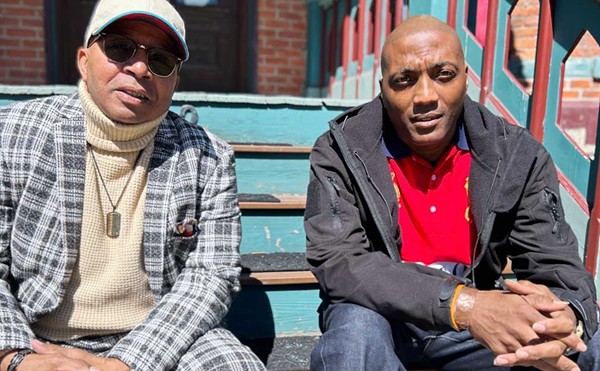"We know there will be many people unhappy with us."
—Paul Anger, vice president and editor of Gannett's Detroit Free Press
"One, I'm fired. And two, I've led two great institutions down the wrong path.
—Dave Hunke, CEO of the Gannett-controlled Detroit Media Partnership, when asked what happens if his experiment fails
Last week the Detroit Media Partnership announced its latest "historic" and "exciting" transformation of The Detroit News and the Detroit Free Press. Basically, here it is: Want a daily home-delivered paper? Well, forget it. Instead, buy a computer with a really big monitor so you can read what we choose to give you, or go subscribe to the goddamn New York Times.
Gannett's thinly disguised monopoly will now consent to bring you the News and/or Free Press on Thursday, Friday and Sunday. Fat papers, they hope; papers they want to see crammed with advertising inserts that will fall onto your shoes when you pick them up.
But on the other four days of the week, they won't bring you a newspaper any more. Yes, there will be some thin "express edition" papers tucked into newspaper boxes ... at least for a while. They will even mail one to you, for a hefty fee, and their circulation department assures us that "mail-delivered newspapers should arrive in your mailboxes the same day they are printed." Sure they will.
When the newspapers confirmed Dec. 16 what I had reported here a week or so earlier, one of the first people I heard from was Alice, a speech pathologist who works with people in nursing homes. She was exasperated at the callousness toward the readers. "That's how my patients orient themselves. That is their lifeline to the outside world. They look at the paper and know what day it is."
Yes, her patients had heard the explanations by the executives in suits. They understood that they weren't going to get their newspaper every day. And they were hopping mad. (The Partnership has said it wouldn't allow bulk sales of the newsstand editions to places like nursing homes.)
Now, my speech pathologist isn't privy to the great conversations the Detroit newspaper executives have when they talk to each other about what real people want. She only has to deal with people in the real world, some of whom are frail and bedridden and nearly all of whom are avid newspaper readers. Soon to be, former newspaper readers.
Naturally, if she knew as much as the suits, she would know that these oldsters are eager to buy computers and learn to download PDF files. Granny will certainly find that much nicer than doing the crossword puzzle over coffee.
You understand, of course, that by that point I was a convert to the Detroit newspaper partnership's genius, and was eager to convince Alice how great an idea this was. On Sunday, I had been on WDIV-TV's Flashpoint with three other journalists, who defended the new plan. They savaged me for showing mild skepticism about its brilliance. I knew the fact that their incomes were all dependent on pleasing their corporate bosses had nothing to do with how they felt.
After all, after 19 years in Detroit — first as owner of the News and then the Free Press — Gannett has seen the combined circulation of the two dailies drop from 1.3 million to 476,000.
Unfortunately, I couldn't make much headway with Alice, because of a small inconvenient truth. She used to be a newspaper editor! She was a features editor for a group of small papers once. Then she saw the way the wind was blowing, left the business, had some babies and returned to an honest profession: speech pathology. (Her papers were later bought up and the feature sections gutted by the monster known as Gannett, naturally.)
Which goes to show you that there is little you can do with people who ignore the experts and insist on believing their own eyes.
OK, so now the bottom line, without the sarcasm.
I think the experiment is headed for failure, for this reason: Newspaper readers today are largely older people. To some extent, this was always true; young people wasted more of their time on music and sex and playing sports and sex.
Today, however, young people live on the Internet (curse you, Tim Berners-Lee!). My college students want to read everything that way. They regard newspapers the way I do the Dead Sea Scrolls. Now I — well into my 50s — read things on the Internet every day, thank you very much. But I prefer reading newspapers on paper.
Virtually nobody my age or above wants to read papers on the Internet. Most people older than me who are not in the communications business don't know what a PDF file is, period, don't want to learn how to download one, and won't read a paper that way.
Twenty years from now, the papers probably could get away with this. They might do so now, if they were willing to go through a gradual weaning process. But they aren't. They will tell you they are losing money, and can't afford to. They are right about the losing money part. And let's give some praise where praise is due. Read again the statements atop this column. You have to give these men credit for what must rank as utterly astonishing candor. Especially, that is, for anyone who has listened as long as I have to the public statements of newspaper corporations, especially perhaps Gannett.
But the suits sounded almost desperate. All accounts seem to agree that this "Project Griffon" was not imposed on Detroit from Gannett corporate headquarters in Virginia.
They came up with it themselves.
"We are not making money right now," Paul Anger said when they announced this. But for a long time they did. Gannett papers traditionally delivered unheard-of profit margins. The parent corporation makes boatloads of money; last year, Detroit was the only Gannett paper that showed a loss. They could help make this a gradual transition.
Sports Illustrated, after all, lost money for years, as did People, before turning into cash cows. But they had a parent company — Time — that didn't freak out at the latest daily rumblings on the stock exchanges. Gannett is not like that.
Frankly, I hope I am wrong, that these papers thrive and flourish. I hope that they don't pull the plug on the News, the stronger news product, and that the Free Press discovers that Matty Moroun may be far more important, in the final analysis, than one sleazy mayor who learned how to text-message.
However, if you look back on the various promises and predictions Gannett has made since it arrived to suck the lifeblood out of the Detroit News (See Bryan Gruley's excellent book Paper Losses) you can't be too very optimistic.
Newspapers nationwide are in crisis, thanks in large part to changing media tastes, but also to greed and mismanagement. But they are desperately needed; otherwise, Kwame Kilpatrick would still be mayor, Richard Nixon would have gone on abusing power, and citizens of 10,000 towns would not have a clue how their government works. We need to make sure newspapers continue to thrive, and that everyone has an opportunity to read them too.
Jack Lessenberry opines weekly for Metro Times. Contact him at [email protected]




